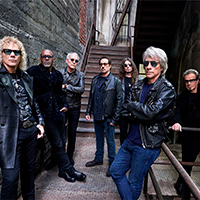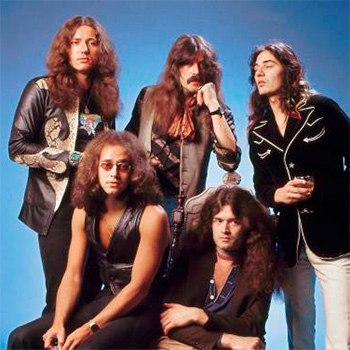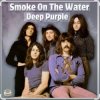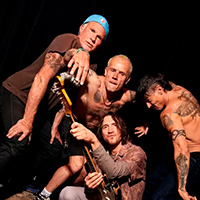

Deep Purple is a British rock band formed in 1968 in Hertford. The group is regarded as one of the three pillars of hard rock and early heavy metal, alongside Led Zeppelin and Black Sabbath. Their record sales exceed 100–120 million copies, and their influence on music is monumental — from hard rock and progressive rock to power metal, grunge, and neoclassical rock.
Deep Purple became famous for their fusion of:
- heavy guitar riffs
- virtuosic solos
- progressive arrangements
- charismatic vocals
- the unique sound of the Hammond organ
And, of course, they created one of the most iconic riffs in history — “Smoke on the Water”.
Formation and Early Years (1968–1970)
Original lineup:
- Ritchie Blackmore — guitar
- Jon Lord — keyboards
- Ian Paice — drums
- Rod Evans — vocals
- Nick Simper — bass
The band began as a progressive rock/psychedelic rock project.
During this period they released:
- Shades of Deep Purple (1968) — featuring the hit cover Hush
- The Book of Taliesyn (1968)
- Deep Purple (1969)
But the real breakthrough was yet to come — with the shift toward a heavier, more aggressive sound.
Mark II — The Golden Lineup (1970–1973)
The most legendary incarnation of Deep Purple:
- Ian Gillan — vocals
- Ritchie Blackmore — guitar
- Roger Glover — bass
- Jon Lord — keyboards
- Ian Paice — drums
From 1970 to 1973, the band created the foundation of classic hard rock, defining an entire era.
Their masterpieces from this period include:
- Deep Purple in Rock (1970)
- Fireball (1971)
- Machine Head (1972)
- Made in Japan (1972) — one of the greatest live albums ever recorded
The album Machine Head produced:
- Smoke on the Water
- Highway Star
- Lazy
Deep Purple instantly became headliners of major global festivals.
Mark III and Mark IV — The Experimental Era
After Gillan and Glover left in 1973, the lineup changed again:
- David Coverdale — vocals
- Glenn Hughes — bass/vocals
Their sound became more blues-oriented and soulful. Albums:
- Burn (1974) — a powerful reinvention, one of the best releases of the 70s
- Stormbringer (1974)
In 1975, Ritchie Blackmore left the band to form Rainbow.
He was replaced by Tommy Bolin, which led to the experimental album Come Taste the Band (1975).
After Bolin’s tragic death in 1976, the band disbanded.
Return of the Legends — Mark II Reunion (1984–1989)
Deep Purple made a triumphant comeback in 1984 with:
- Perfect Strangers — an international tour that drew record audiences
- The House of Blue Light (1987)
But tensions between Blackmore and Gillan once again led to instability.
The 1990s–2000s: Change, Tragedy, Evolution
- 1993 — release of The Battle Rages On…, Blackmore’s final album with the band
- 1994 — Steve Morse joins, refreshing the band’s sound
- 2002 — passing of Jon Lord, one of the greatest keyboardists of all time
- Don Airey becomes the new keyboardist
This era is viewed as the period of “mature melodic power” for Deep Purple.
The Modern Era (2010s–Today)
Deep Purple continue to tour and release critically acclaimed albums:
- Now What?! (2013) — their first #1 in Germany in 40 years
- Infinite (2017)
- Whoosh! (2020)
- Turning to Crime (2021) — a covers album
The band was inducted into the Rock and Roll Hall of Fame in 2016.
Steve Morse departed in 2022 for family reasons, replaced by Simon McBride.
Musical Style and Influence
Deep Purple is a unique fusion of:
- hard rock aggression
- progressive structures
- instrumental virtuosity
- classical harmony (Bach- and Beethoven-inspired arrangements by Jon Lord)
They influenced:
- Metallica
- Iron Maiden
- Queen
- Motörhead
- Van Halen
- Yngwie Malmsteen
- Dream Theater
— and thousands of other bands in heavy metal and progressive rock.
Iconic Songs
- Smoke on the Water
- Highway Star
- Child in Time
- Burn
- Black Night
- Perfect Strangers
- Hush
- Soldier of Fortune
- Lazy
- Mistreated
Main Discography
Key Studio Albums:
1968 — Shades of Deep Purple
1968 — The Book of Taliesyn
1969 — Deep Purple
1970 — Deep Purple in Rock
1971 — Fireball
1972 — Machine Head
1973 — Who Do We Think We Are
1974 — Burn
1974 — Stormbringer
1975 — Come Taste the Band
1984 — Perfect Strangers
1987 — The House of Blue Light
1990 — Slaves and Masters
1993 — The Battle Rages On…
1996 — Purpendicular
1998 — Abandon
2003 — Bananas
2005 — Rapture of the Deep
2013 — Now What?!
2017 — Infinite
2020 — Whoosh!
2021 — Turning to Crime
Interesting Facts
- In 1972 Deep Purple were listed in the Guinness World Records as “the world’s loudest band”.
- “Smoke on the Water” is based on a real casino fire in Montreux.
- Their lineup system (Mark I, II, III, IV…) is unique in rock history.
- Ian Paice is the only member who played in every lineup.
- Jon Lord fused rock with symphony orchestra in the revolutionary Concerto for Group and Orchestra (1969).
- Deep Purple helped shape neoclassical metal through Blackmore’s playing.
Deep Purple is a band that has transcended eras and genres. They survived decades of musical evolution while preserving the essence of their sound — power, precision, and unmatched live performance energy. Their influence can be heard in every hard rock riff, every metal solo, and every concert where fans raise their hands as the opening notes of “Smoke on the Water” begin to play. Deep Purple remains a living legend — a band that didn’t just define the genre but set the standard musicians strive for even today.







